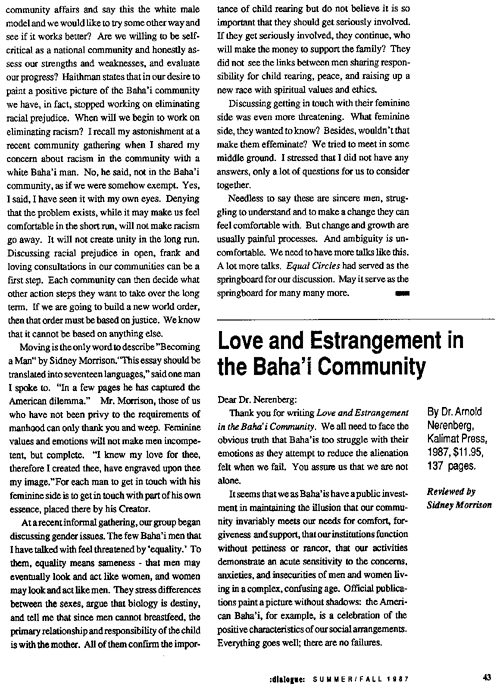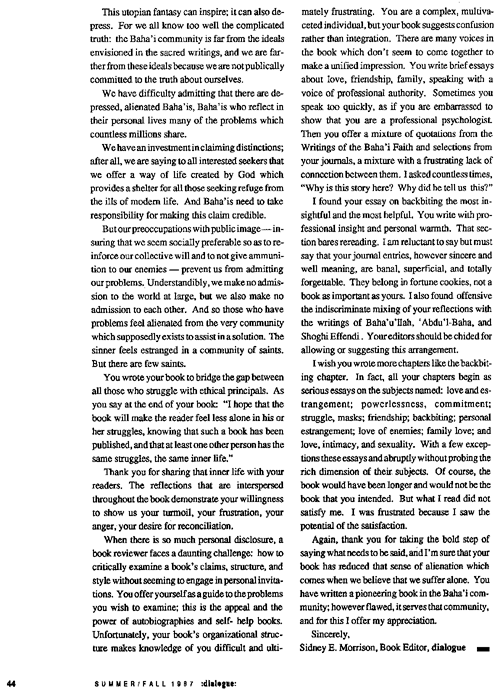
|
|
Abstract: On personal feelings of alienation in the Bahá'í community, self image, and backbiting. Notes: See also list of dialogue articles or image scans. |
Love and Estrangement in the Bahá'í Community, by Arnold Nerenberg:
Review
by Sidney Edward Morrison
published in dialogue, 2:1, pages 43-44Los Angeles: 1987
Author: Dr. Arnold Nerenberg
Publisher: Los Angeles: Kalimat Press (1987)
Review by: S. E. Morrison
Review published in: dialogue 2:1 (1987)
Dear Dr. Nerenberg:
Thank you for writing Love and Estrangement in the Bahá'í Community. We all need to face the obvious truth that Bahá'ís too struggle with their emotions as they attempt to reduce the alienation felt when we fail. You assure us that we are not alone.
It seems that we as Bahá'ís have a public investment in maintaining the illusion that our community invariably meets our needs for comfort, forgiveness and support, that our institutions function without pettiness or rancor, that our activities demonstrate an acute sensitivity to the concerns, anxieties, and insecurities of men and women living in a complex, confusing age. Official publications paint a picture without shadows: the American Bahá'í, for example, is a celebration of the positive characteristics of our social arrangements. Everything goes well; there are no failures.
This utopian fantasy can inspire; it can also depress. For we all know too well the complicated truth: the Bahá'í community is far from the ideals envisioned in the sacred writings, and we are farther from these ideals because we are not publically committed to the truth about ourselves.
We have difficulty admitting that there are depressed, alienated Bahá'ís, Bahá'ís who reflect in their personal lives many of the problems which countless millions share.
We have an investment in claiming distinctions; after all, we are saying to all interested seekers that we offer a way of life created by God which provides a shelter for all those seeking refuge from the ills of modern life. And Bahá'ís need to take responsibility for making this claim credible.
But our preoccupations with public image—insuring that we seem socially preferable so as to reinforce our collective will and to not give ammunition to our enemies—prevent us from admitting our problems. Understandably, we make no admission to the world at large, but we also make no admission to each other. And so those who have problems feel alienated from the very community which supposedly exists to assist in a solution. The sinner feels estranged in a community of saints. But there are few saints.
You wrote your book to bridge the gap between all those who struggle with ethical principles. As you say at the end of your book: “I hope that the book will make the reader feel less alone in his or her struggles, knowing that such a book has been published, and that at least one other person has the same struggles, the same inner life.”
Thank you for sharing that inner life with your readers. The reflections that are interspersed throughout the book demonstrate your willingness to show us your turmoil, your frustration, your anger, your desire for reconciliation.
When there is so much personal disclosure, a book reviewer faces a daunting challenge: how to critically examine a book’s claims, structure, and style without seeming to engage in personal invitations. You offer yourself as a guide to the problems you wish to examine; this is the appeal and the power of autobiographies and self-help books. Unfortunately, your book’s organizational structure makes knowledge of you difficult and ultimately frustrating. You are a complex, multifaceted individual, but your book suggests confusion rather than integration. There are many voices in the book which don’t seem to come together to make a unified impression. You write brief essays about love, friendship, family, speaking with a voice of professional authority. Sometimes you speak too quickly, as if you are embarrassed to show that you are a professional psychologist. Then you offer a mixture of quotations from the Writings of the Bahá'í Faith and selections from your journals, a mixture with a frustrating lack of connection between them. I asked countless times, “Why is this story here? Why did he tell us this?”
I found your essay on backbiting the most insightful and the most helpful. You write with professional insight and personal warmth. That section bares rereading. I am reluctant to say but must say that your journal entries, however sincere and well meaning, are banal, superficial, and totally forgettable. They belong in fortune cookies, not a book as important as yours. I also found offensive the indiscriminate mixing of your reflections with the writings of Bahá'u'lláh, ‘Abdu'l-Bahá, and Shoghi Effendi. Your editors should be chided for allowing or suggesting this arrangement.
I wish you wrote more chapters like the backbiting chapter. In fact, all your chapters begin as serious essays on the subjects named: love and estrangement; powerlessness, commitment; struggle, masks; friendship; backbiting; personal estrangement; love of enemies; family love; and love, intimacy, and sexuality. With a few exceptions these essays end abruptly without probing the rich dimension of their subjects. Of course, the book would have been longer and would not be the book that you intended. But what I read did not satisfy me. I was frustrated because I saw the potential of the satisfaction.
Again, thank you for taking the bold step of saying what needs to be said, and I’m sure that your book has reduced that sense of alienation which comes when we believe that we suffer alone. You have written a pioneering book in the Bahá'í community; however flawed, it serves that community, and for this I offer my appreciation.
- Sincerely,
Sidney E. Morrison, Book Editor, dialogue
 click for larger image |
 click for larger image |
|
|